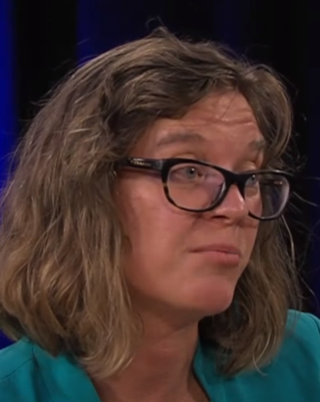
The Constitution of the State of Vermont is the fundamental body of law of the U.S. state of Vermont, describing and framing its government. It was adopted in 1793 following Vermont's admission to the Union in 1791 and is largely based upon the 1777 Constitution of the Vermont Republic which was drafted at Windsor in the Old Constitution House and amended in 1786. At 8,295 words, it is the shortest U.S. state constitution. Largely unchanged since 1777, Vermont's Constitution is the only active constitutional document to have been drafted and ratified outside of the United States.

A civil union is a legally recognized arrangement similar to marriage, created primarily as a means to provide recognition in law for same-sex couples. Civil unions grant some or all of the rights of marriage.

The New York State Legislature consists of the two houses that act as the state legislature of the U.S. state of New York: the New York State Senate and the New York State Assembly. The Constitution of New York does not designate an official term for the two houses together; it says only that the state's legislative power "shall be vested in the senate and assembly". Session laws passed by the Legislature are published in the official Laws of New York. Permanent New York laws of a general nature are codified in the Consolidated Laws of New York. As of January 2021, the Democratic Party holds supermajorities in both houses of the New York State Legislature, which is the highest paid state legislature in the country.

Daniel J. O'Donnell is an American politician from the state of New York. A Democrat, he is a member of the New York State Assembly. O'Donnell represents the 69th district in Manhattan, made up of the neighborhoods of Manhattan Valley, Morningside Heights, and portions of the Upper West Side and West Harlem.

The Minnesota Legislature is the bicameral legislature of the U.S. state of Minnesota consisting of two houses: the Senate and the House of Representatives. Senators are elected from 67 single-member districts. In order to account for decennial redistricting, members run for one two-year term and two four-year terms each decade. They are elected for four-year terms in years ending in 2 and 6, and for two-year terms in years ending in 0. Representatives are elected for two-year terms from 134 single-member districts formed by dividing the 67 senate districts in half.

Dorothy Louise Slaughter was an American politician elected to 16 terms as a United States Representative from New York, serving from 1987 until her death in 2018. She served as the Dean of the New York Congressional Delegation for the last few terms as Congresswoman before her death.

David E. Zuckerman is an American politician who is currently serving as the 84th lieutenant governor of Vermont since 2023. He previously served two terms as the 82nd lieutenant governor of Vermont, from 2017 to 2021. A member of the Vermont Progressive Party, he previously served in the Vermont House of Representatives for seven terms (1997–2011), and the Vermont Senate for two (2013–2017). In 2020, Zuckerman was a candidate for governor of Vermont. He ran with the support of both the Progressive Party and the Democratic Party, but lost to incumbent governor Phil Scott in the general election.

Unisex public toilets are public toilets that are not separated by sex or gender.

At the 2004 and 2005 town meetings, the citizens of the ski resort community of Killington, Vermont, voted in favor of pursuing secession from Vermont and admission into the state of New Hampshire, which lies 25 miles (40 km) to the east.

Connie Berube Binsfeld was an American Republican politician from the U.S. State of Michigan. She served as the 60th lieutenant governor of Michigan. Starting as an advocate for the environment in planning for the Sleeping Bear Dunes National Lakeshore, she also was known for protecting interests of women and children. She was the first woman to hold leadership posts in Michigan's House, Senate and executive branch, where she served four terms in the House, two in the Senate, and two as Lieutenant Governor.

Philip Brian Scott is an American politician, businessman, and stock car racer who has been the 82nd governor of Vermont since 2017. A member of the Republican Party, he was a representative for the Washington District in the Vermont Senate from 2001 to 2011 and served as the 81st lieutenant governor of Vermont from 2011 to 2017.

Donald H. Turner Jr. was an American Republican politician who served in the Vermont House of Representatives, to which he was first elected in 2006. He represented the Chittenden-9 district until 2012 and represented the Chittenden-10 district from 2013 to 2019 for the town of Milton in Chittenden County. He also served as the Minority Leader of the Vermont House of Representatives from 2011 to 2019. Turner later served as the Town Manager of Milton as well as a member of the Board of Civil Authority. He was also a certified fire instructor, a member of the International Association of Fire Chiefs, Milton Firefighters Association, and was the Milton Fire and Rescue Chief and Forest Fire Warden.

Vermont is seen as one of the most liberal states in the U.S. in regard to lesbian, gay, bisexual, transgender, and queer (LGBTQ) rights, with most progress in jurisprudence having occurred in the late 20th and the early 21st centuries. Vermont was one of 37 U.S. states, along with the District of Columbia, that issued marriage licenses to same-sex couples prior to the landmark Supreme Court ruling of Obergefell v. Hodges, establishing equal marriage rights for same-sex couples nationwide.
A bathroom bill is the common name for legislation or a statute that denies access to public toilets by gender or transgender identity. Bathroom bills affect access to sex-segregated public facilities for an individual based on a determination of their sex as defined in some specific way, such as their sex as assigned at birth, their sex as listed on their birth certificate, or the sex that corresponds to their gender identity. A bathroom bill can either be inclusive or exclusive of transgender individuals, depending on the aforementioned definition of their sex.

Rebecca A. Balint is an American politician who is a member of the United States House of Representatives from Vermont's at-large congressional district as a member of the Democratic Party. She served as a member of the Vermont Senate from Windham County from 2015 to 2023, as majority leader from 2017 to 2021, and as president pro tempore from 2021 to 2023.

Linda Duba is an American politician and educator based in Sioux Falls, South Dakota. She serves in the South Dakota lower house as one of the Democratic representatives of the 15th District along with Jamie Smith. Her district covers the northern part of Sioux Falls including the Downtown, Whittier, Cathedral, Terrace park, West 10th Street, and Garfield neighborhoods. The 15th District lies completely within Minnehaha county. Duba succeeded Representative Karen Soli in 2019.

Selene Colburn is an American politician currently serving in the Vermont House of Representatives from the Chittenden-6-4 district since 2017 as a member of the Vermont Progressive Party. Prior to her tenure in the State House, she served on the city council in Burlington, Vermont. She is the first female chair of the House Progressive Caucus.

Michelle Bos-Lun is an American educator who also works in social services and restorative justice. She has been a politician since being elected in 2020. She is a state representative initially elected to Windham-4 for her first term, but after redistricting, now serving Windham-3 district of Vermont.
The right to sit in the United States refers to state and local laws and regulations guaranteeing workers the right to sit at work when standing is not necessary. The right to sit was a pillar of the early labor movement. Between 1881 and 1917, almost all states, the District of Columbia, and Puerto Rico had passed legislation concerning suitable seating for workers. These laws were enacted during the Progressive Era, spearheaded by women workers in the labor movement.

The Creating a Respectful and Open World for Natural Hair Act of 2022 was a bill in the United States Congress intended to prohibit discrimination based on an individual's hair texture or hairstyle by classifying such discrimination illegal under federal law. It applied to federally assisted programs, housing programs, public accommodations, and employment. The act was introduced in the House of Representatives by Congresswoman Bonnie Watson Coleman (D-NJ) on March 19, 2021. Senator Cory Booker (D-NJ) introduced a companion bill in the Senate on March 22, 2021. The CROWN Act of 2022 marked the second time the legislation was introduced in Congress.

















